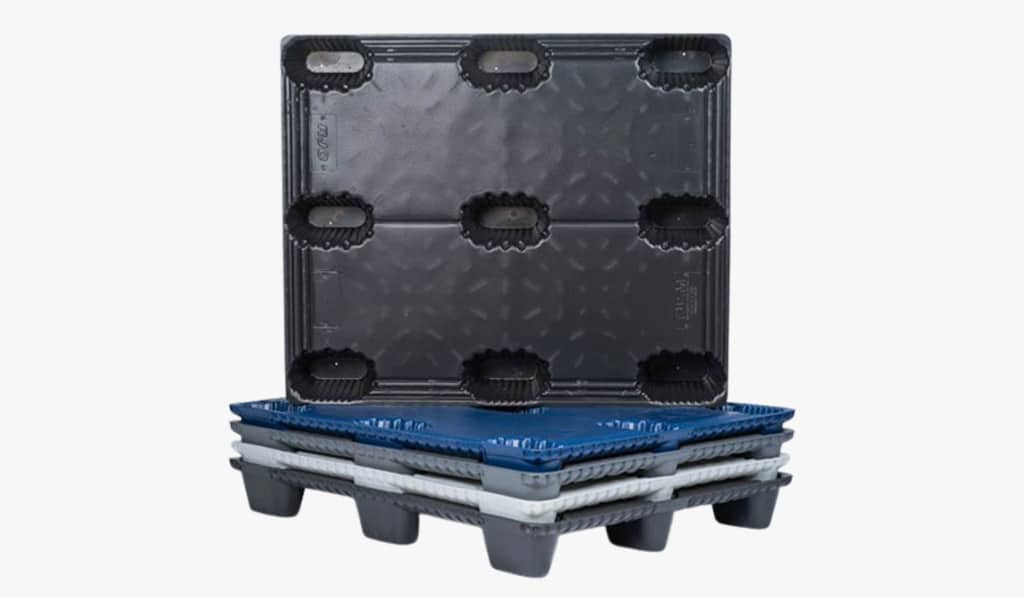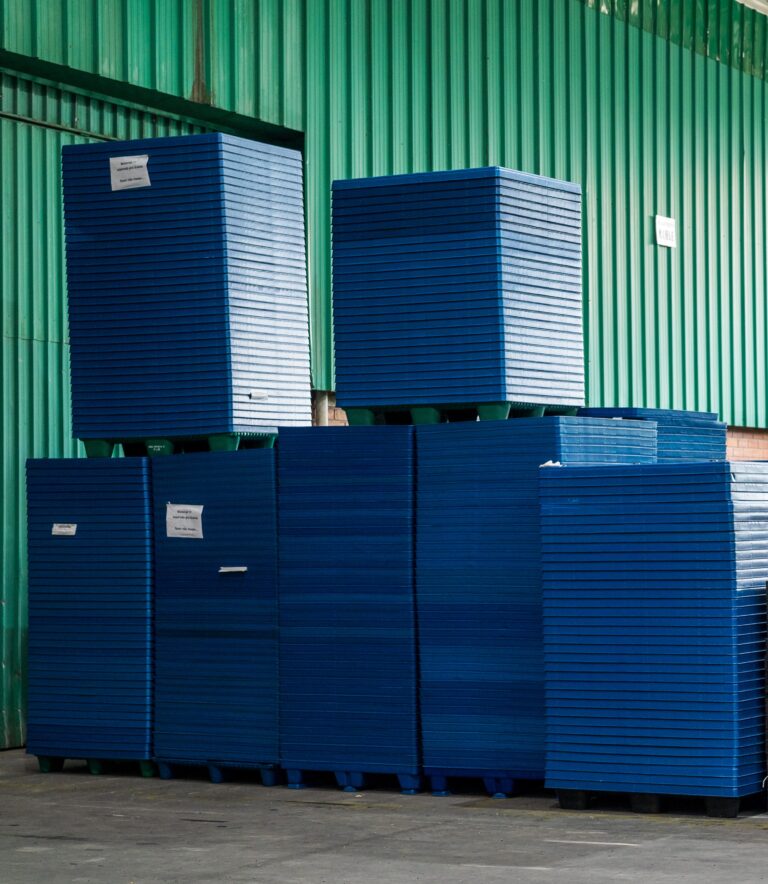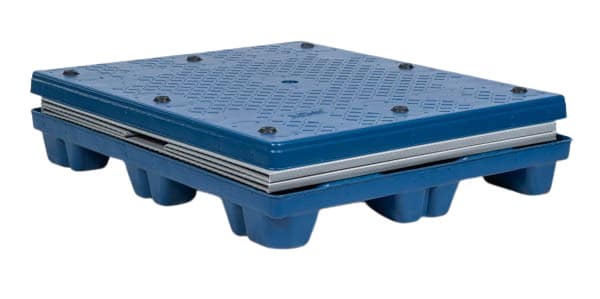Containment pallets: what are they and what are they used for?
The containment pallet is an essential piece of equipment in the industrial environment, designed to store drums, gallons and drums containing potentially dangerous liquids, such as chemical and flammable substances.
Its main function is to contain any leaks or spills of these liquids, preventing them from reaching the ground, contaminating the environment or putting the safety of employees and company facilities at risk.
In addition to their obvious importance in terms of safety, containment pallets are fundamental to logistical efficiency, as they facilitate the safe storage and transportation of these materials, reducing handling time and operating costs.
Benefits of the containment pallet in logistics and warehousing
Containment pallets have a number of benefits that go beyond simply retaining leaks. They ensure the safe handling of hazardous materials and the logistical efficiency of companies.
Prevents leaks and protects the environment
One of the main benefits of the containment pallet is its ability to prevent leaks and protect the environment.
By containing any spills of hazardous liquids, they prevent these substances from contaminating soil and water.
This is an important factor in industrial sectors that deal with large volumes of chemicals, as contamination can have serious and long-lasting consequences for the local ecosystem.
Safety in the storage of chemical and pharmaceutical products
The storage of medicines and chemical products requires special care due to the risks associated with these materials.
Containment pallets are designed to provide an extra layer of safety, preventing leaks from causing harm to workers and the environment.
They help to organize and store these products safely, reducing the possibility of accidents.
Reducing risks when transporting liquids and dangerous substances
When transporting liquids and hazardous substances, containment pallets make a major contribution to reducing risks.
They are made from robust materials, such as polyethylene, which are resistant to chemical agents and impacts, ensuring that the transported substances reach their destination without incident.
This protects workers and minimizes the risk of environmental damage along the way.
Containment pallet applications in different sectors
The versatility of containment pallets allows them to be used in a wide range of industrial sectors, where safety and logistical efficiency are priorities.
Use in the chemical and petrochemical industry
In the chemical and petrochemical industry, containment pallets are widely used to store and transport a variety of hazardous products.
Due to the nature of these materials, it is necessary for companies to implement strict safety measures to prevent leaks and contamination.
Containment pallets provide the confidence needed to handle these products safely, maintaining the integrity of industrial processes.
Safe storage of medicines and pharmaceutical supplies
In the pharmaceutical sector, the safe storage of medicines and supplies is extremely important.
Containment pallets help ensure that these products are kept in safe conditions, avoiding contamination and exposure to dangerous substances.
They facilitate compliance with regulatory standards governing the storage of pharmaceutical materials, avoiding penalties and sanctions.
Environmental protection in the agricultural and industrial sector
In the agricultural and industrial sectors, environmental protection is a constant concern.
Containment pallets help preserve the environment by preventing chemical spills from damaging soil and water.
This is a very important fact in areas where agriculture is predominant, as contamination can affect the quality of crops and the health of workers.
Palletizing loads: how containment pallets make the process safer
Palletizing loads is an essential process in modern logistics, and containment pallets contribute significantly to the safety of this process.
Improved organization and handling of liquid cargo
Containment pallets allow for better organization and handling of liquid cargo.
By providing a safe and efficient means of storing and transporting these materials, they help to optimize storage space and facilitate access to products.
In this way, they improve operational efficiency and reduce the time needed to move loads, increasing productivity.
Reducing waste and environmental impacts
Another advantage of containment pallets is the reduction of waste and environmental impact. By preventing leaks, they ensure that as much of the stored product as possible is used, minimizing losses and contributing to the sustainability of operations.
Preventing leaks reduces the need for cleaning and decontamination, saving resources and protecting the environment.
Compliance with safety standards and regulations
Containment pallets help companies meet safety standards and regulations relating to the storage and handling of hazardous materials, avoiding penalties and ensuring compliance with legal requirements.
By using this equipment, companies are demonstrating their commitment to safety and environmental responsibility.
Industrial and reinforced pallets: what's the relationship with the containment pallet?
Industrial and reinforced pallets also play an important role in safety and logistical efficiency, especially when it comes to handling dangerous cargo.
When to use reinforced pallets for dangerous goods?
Reinforced pallets are ideal for handling dangerous cargo due to their greater strength and durability.
They are made from robust materials and designed to withstand adverse conditions, guaranteeing the integrity of the products stored and transported.
The use of reinforced pallets is essential to avoid accidents and damage when handling hazardous materials.
Advantages of industrial pallets in high-volume logistics
In high-volume logistics, industrial pallets offer several advantages. They make it easier to organize and move loads, optimizing storage space and improving operational efficiency.
They are designed to withstand high weights and adverse conditions, guaranteeing the safety of the products and the workers involved in the logistics process.
How do polypropylene pallets contribute to hygiene and durability?
Polypropylene pallets are a popular choice due to their hygiene and durability characteristics.
This material is resistant to chemical agents and corrosion, as well as being easy to clean, which is particularly important in sectors that require high hygiene standards, such as pharmaceuticals and food.
The durability of polypropylene pallets also helps to reduce maintenance and replacement costs, making them an economical and efficient option.
Conclusion
In short, containment pallets play a crucial role in industrial safety and logistical efficiency.
They offer a practical and effective solution for storing and transporting hazardous liquids, while protecting the environment and ensuring the integrity of employees.
By using containment pallets, companies can improve the organization and handling of loads, reduce waste and environmental impacts, and comply with safety standards and regulations.
In addition, the choice of industrial and polypropylene pallets provides additional benefits in terms of resistance, durability and hygiene, contributing to the optimization of logistics processes and the sustainability of operations.







